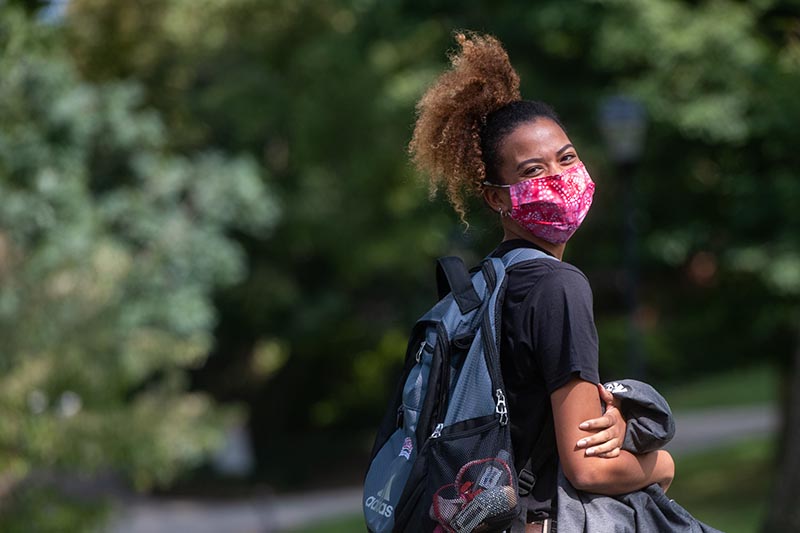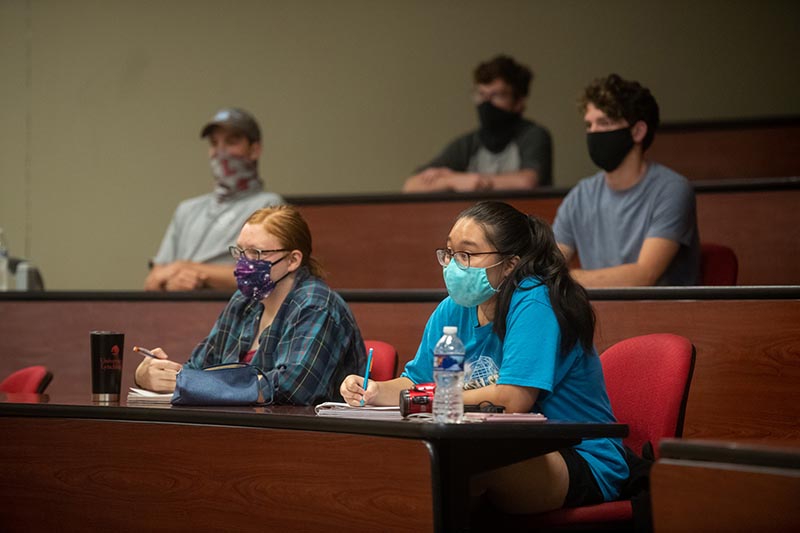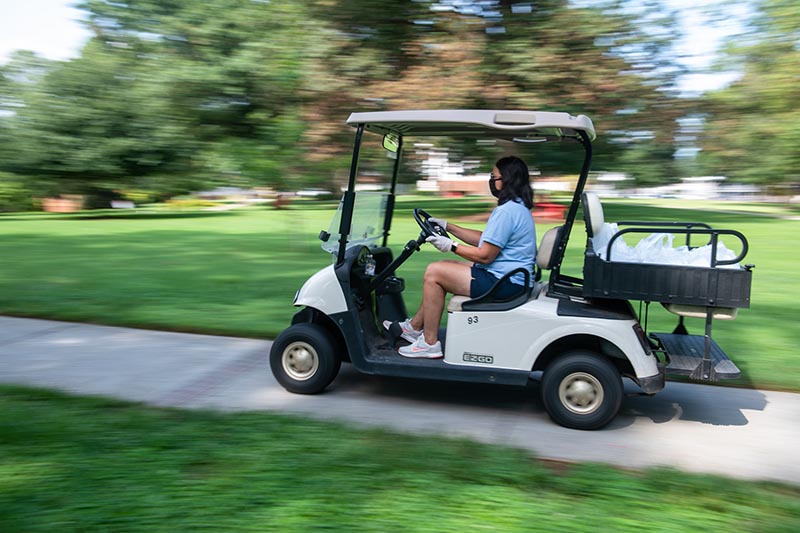
When students leave campus for winter break on Nov. 24, the University of Lynchburg will have reached a big milestone: completing the Fall 2020 semester on campus in the middle of a pandemic without a major outbreak.
An initial spike of 46 positive COVID-19 cases among students in late August was quickly controlled by moving classes online temporarily and isolating some students off-site. Within two weeks, course delivery returned to the original fall format of in-person, hybrid, and online classes, and cases remained in the single digits for most of the semester.
As of Nov. 18, the University had seen 147 student cases and just eight cases among faculty and staff. That’s 5% of the student body and 1% of the workforce.
“We stayed the course and followed the guidance of the Virginia Department of Health and the CDC,” said Lisa Geier, clinical director at the University of Lynchburg’s health center. “Aggressive testing and identification of positive cases, and performing our own contact-tracing, allowed us to quickly isolate and quarantine cases. This was an important strategy to mitigate the spread of the virus and bring our case numbers down.
“We also recognize that the majority of students were doing their part in reducing the spread of disease by following good health practices and avoiding large gatherings. The University learned a lot this semester, and I feel we are prepared to meet the pandemic challenges that may come next year.”

When classes shifted online in March, then-President Ken Garren acted quickly to appoint a COVID-19 Task Force consisting of University leadership and health experts. Working with the VDH and the local hospital system Centra through the summer, the task force began formulating comprehensive public health, student life, and academic plans for a safe return in the fall.
“[We] worked diligently with faculty, staff, students, and parents to navigate the crisis while always making sure our community has the highest standard of health and safety,” said Dr. Jeremy Welsh, dean and chair of the School of PA Medicine and senior associate dean of the College of Health Sciences. Welsh also is a member of Gov. Ralph Northam’s task force on primary care.
Meanwhile, Vice President for Business and Finance Steve Bright spent many sleepless nights crunching numbers and allotting CARES Act funding to ensure not a single employee was furloughed or layed off.
The University’s thorough planning and consistent communication — from nearly 100 emails to date and a COVID-19 website to a slew of videos, posters, signs, and social media posts — played a big role in boosting cooperation among students, faculty, and staff. It also made the fall semester a success, said Vice President for Communications and Marketing Michael Jones.
“Once we had everyone back on campus, regular communication and constant reminders were critical to making the plan work,” Jones said. “We regularly reached out to students, faculty, and staff to keep them informed and remind them of the protocols: Take your temperature, wash your hands, wear your mask, maintain a safe social distance. I’m especially proud of our students and their families for all they did to keep our community safe.”
When it became clear that the fall season wouldn’t look the same for athletes, Director of Athletics Jon Waters jumped into action to make sure his students would still get the most out of their Lynchburg experience. With Ed Smith, head strength and conditioning coach, he developed NCAA-compliant phases under which student-athletes could safely get back in the gym and onto the field, even if they weren’t competing.
Student development and residence life worked tirelessly to devise logistics for move-in days, including spreading them out and requiring students to sign up for time slots. Planning also involved setting aside quarantine spaces for the inevitable cases that would crop up once students arrived, and collaborating with housekeeping and dining services to make sure those spaces were sanitized and students were fed.

In addition to delivering meals and snacks to students in quarantine, dining prepared for the fall semester by making significant traffic-flow adjustments and capping capacity. Faculty and staff meals were take-out only. Hand sanitizer and plastic gloves became part of the new routine, as did social-distancing floor markers and temperature checks in Drysdale and Schewel. Doors were marked “entrance” or “exit” to avoid traffic jams.
None of that will change in the spring, when classes resume as planned on Jan. 25. The spring semester will begin in Phase 2, with the same mix of in-person, hybrid, and online courses. Masks will still be required everywhere on campus, except when eating, exercising, or when in one’s residence.
“Our students have done an amazing job following the guidelines we’ve put into place, and the numbers show that their vigilance has paid off,” President Dr. Alison Morrison-Shetlar said. “However, we can’t let our guard down. The virus will be with us for a while, so we have to continue to follow the protocols to help keep everyone safe.”
Morrison-Shetlar officially joined the University in August, but was part of the COVID-19 planning and virtual meetings for months. Through an effort called “Sewcial Hornets,” she drummed up hundreds of “voluntailors” who sewed more than 8,500 masks for students, faculty, and staff over the summer.
She’s not surprised by Lynchburg’s successful “Return to the Hive.”
“As Winston Churchill said, ‘Never waste a good crisis,’ and I think as an institution, we’ve done that, we’ve become more nimble,” Morrison-Shetlar said. “Things that we have thought about doing for a long time, we’re now doing out of necessity. I have seen people coming together in unprecedented ways.
“We’re capitalizing on the fact that everybody brings something to the table, and more conversations have led to better ideas, a more nimble response, streamlining of our processes and procedures, and a greater sense of working together — strange as that may seem in a technological environment.”

